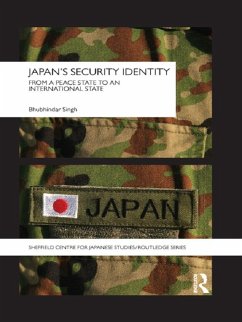To explore the change in Japan's security identity and its associated security behaviour, this book contrasts the three areas that define and shape Japanese security policy: Japan's conception (or definition) of national security; the country's contribution, in military terms, to regional and international affairs; and the changes to the security policy regime responsible for the security policy formulation. Further, it seeks to challenge the dominant realist interpretation of Japanese security policy by adopting an identity-based approach and showing how whilst realist accounts correctly capture the trajectory of Japanese post-Cold War security policy, they fail to explain the underlying causes of the change in Japanese security behaviour in the post-Cold War period.
This book is an important addition to the current literature on Japanese security policy, and will be of great use to students and scholars interested in Japanese and Asian politics, as well as security studies and international relations more broadly.
Dieser Download kann aus rechtlichen Gründen nur mit Rechnungsadresse in A, B, BG, CY, CZ, D, DK, EW, E, FIN, F, GR, HR, H, IRL, I, LT, L, LR, M, NL, PL, P, R, S, SLO, SK ausgeliefert werden.









